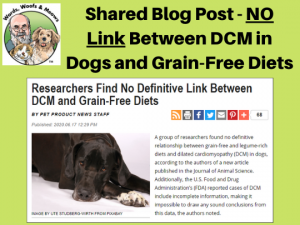< A short link for this page – https://bit.ly/DCM-NOLink-GrainFree-18JUN20 >
In July of 2018, I first reported on the unsubstantiated FDA allegations that grain-free dog foods were contributing to increased cases of heart disease (DCM) in dogs. I promised to keep you updated on the news on this topic and advised you to make sure to get the entire story as many veterinarians, and animal nutritionists disagreed with the opinion piece in a veterinary journal that initiated the FDA report. Since then, much has been published, further challenging the FDA’s statement. A new peer-reviewed article in the Journal of Animal Science indicates that there is no link between DCM in dogs and grain-free diets. You can learn more and find links to the article in Pet Products News and the Journal of Animal Science below.
An article published in Pet Product News on June 17th, 2020 entitled Researchers Find No Definitive Link Between DCM and Grain-Free Diets reports that a newly published review in Journal of ANIMAL SCIENCE ( Review of canine dilated cardiomyopathy in the wake of diet-associated concerns ) reports:
“A group of researchers found no definitive relationship between grain-free and legume-rich diets and dilated cardiomyopathy (DCM) in dogs…” [ Emphasis Added ]
“Additionally, the U.S. Food and Drug Administration’s (FDA) reported cases of DCM include incomplete information, making it impossible to draw any sound conclusions from this data, the authors noted.” [ Emphasis Added ]
The peer-reviewed article is based on the results of more than 150 studies on DCM. The lead authors are Dr. Sydney McCauley, an animal nutritionist, and Dr. Eva Oxford, a veterinary cardiologist. Dr. McCauley noted, “What the science does make clear is that DCM is largely an inherited disease.”
Recommended Resources
Articles on Don’s Blog
( http://www.words-woofs-meows.com )
FDA Update on Heart Disease in Dogs & What Should You Do? – 7JUL19 – http://bit.ly/FDA-DCM-Food-7JUL19
Shared Articles – More on the FDA, DCM, and Pet Food – 10JUL19 – http://bit.ly/FDA-DCM-Food-10JUL19
Shared Articles – Do the Vets Behind the FDA Investigation Have A Conflict of Interest? – 31JUL19 – http://bit.ly/DCM-FDA-Conflict
Pet Nutrition – Grain-Free Foods and FDA Reports of Increased Heart Disease in Dogs – 23JUL18 – http://blog.greenacreskennel.com/2018/07/22/pet-nutrition-grain-free-foods-and-fda-reports-of-increased-heart-disease-in-dogs/
Podcasts from The Woof Meow Show
( http://woofmeowshow.libsyn.com/ )
Podcast – DCM, the FDA, and Dog Food-the Science and the Hype with Canine Nutritionist Linda Case – http://bit.ly/Blog-DCM-FDA-8AUG19
Podcast – Pet’s in the News–No. 4 Pet Food, DCM and The FDA – http://bit.ly/WfMw-DCM-FDA-20JUL19
Other Resources
Pet Product News – June 17, 2020 – Researchers Find No Definitive Link Between DCM and Grain-Free Diets – http://www.petproductnews.com/News/Researchers-Find-No-Definitive-Link-Between-DCM-and-Grain-Free-Diets/
Journal of ANIMAL SCIENCE June 15th, 2020 – Review of canine dilated cardiomyopathy in the wake of diet-associated concerns – https://academic.oup.com/jas/article/98/6/skaa155/5857674

